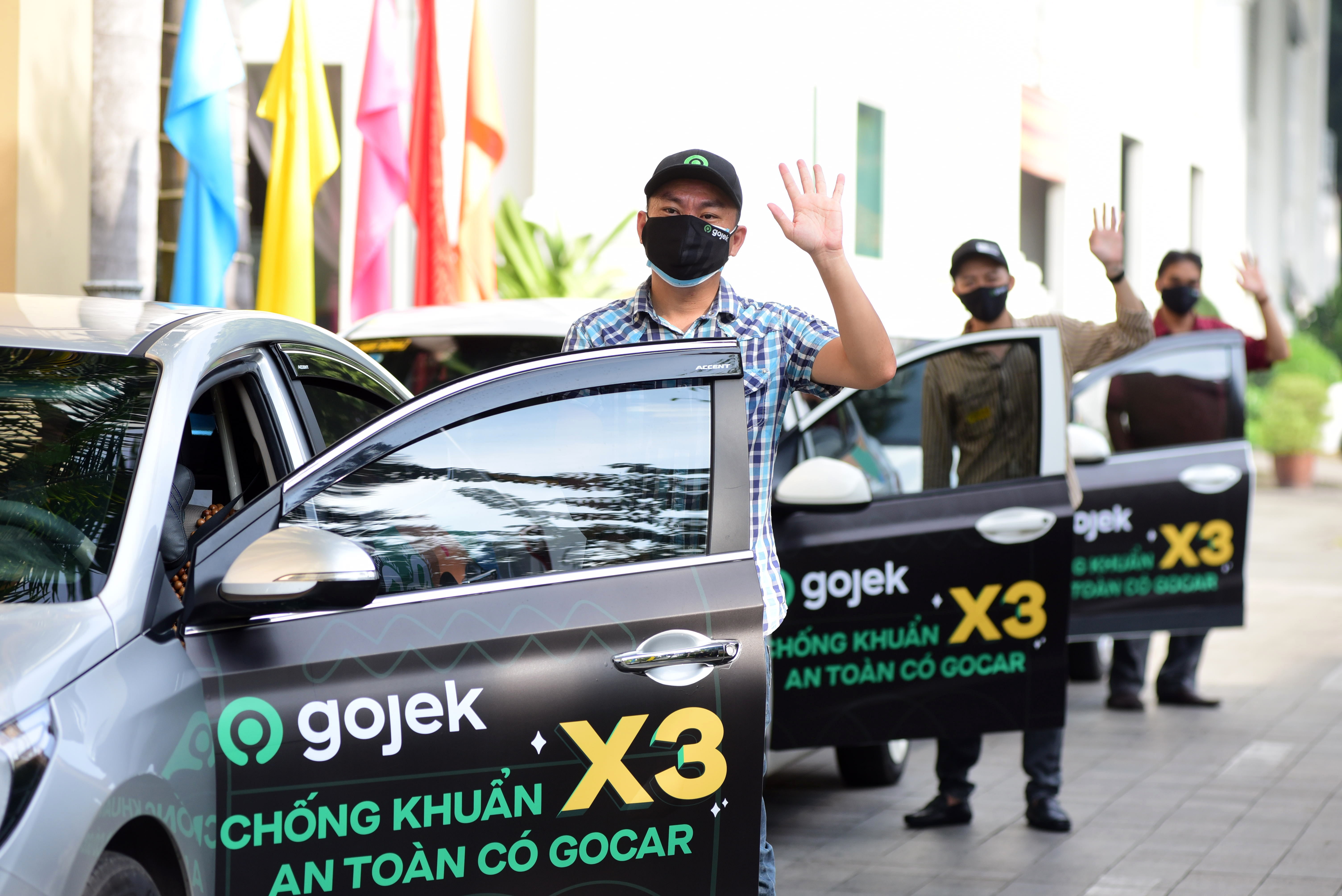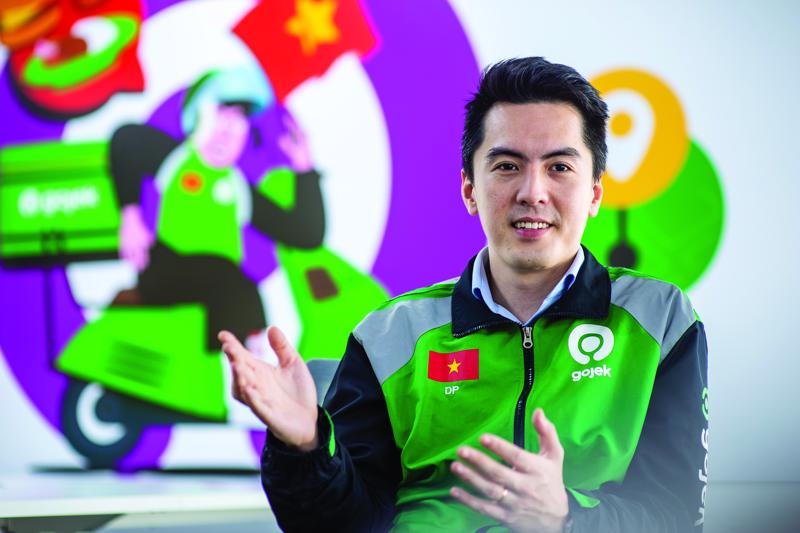While most transportation activities have been frozen due to the fourth wave of Covid-19, Gojek recently announced the launch of GoCar. Why now and what does GoCar have to offer?
GoCar - our four-wheel ride-hailing service - was planned as one of the two key product launches by Gojek Vietnam this year, in addition to cashless payments. We were almost ready for the launch when the fourth wave of Covid-19 hit and Ho Chi Minh City was locked down. So, we decided to switch gears to focus our efforts on supporting our partners and ensuring they could continue to earn sufficient incomes.
In August, at the height of the Covid-19 crisis in Ho Chi Minh City, groups of medical workers from different parts of Vietnam were mobilized to support the city. We recognized there was an unmet demand for transportation services for frontline healthcare workers, so we submitted a proposal to government agencies asking if we could lend a hand with our available car crews. With agreement from the city’s administration, we launched GoCar within two weeks, dedicated to transporting medical staff in the city.
At that point, because health and hygiene were the top priority, we chose to launch GoCar Protect, GoCar’s premium service with enhanced hygiene and safety features. GoCar Protect offers three layers of protection for users, by preventing the spread of viruses that can often occur through close contact or the touching of surfaces. Firstly, all GoCar driver partners are guaranteed to have received two full doses of a Covid-19 vaccine. Secondly, in addition to disinfecting vehicles, all are also equipped with a transparent protective shield between the passenger and the driver. And finally, all vehicles are fitted with Sharp air purifiers, which can neutralize up to 99.4 per cent of airborne viruses. With these safety features in place, there were no reported cases of Covid-19 infection among our users and driver partners during the one month we were supporting healthcare workers.
In November, when social distancing regulations in Ho Chi Minh City were eased, we decided to expand GoCar to all users in the city. We continued to offer GoCar Protect, as we know this will be the new norm in the transportation industry, given that the majority of our users said that “risk of infection” was their No. 1 concern in mobility. This makes GoCar the first and only four-wheel ride-hailing service in Vietnam to equip all vehicles with a protective shield and air purifier, establishing a new standard of safety and hygiene in the industry.
In logistics, we have built three main pillars for GoCar, to ensure the best experience for customers: Technology (information about drivers’ vaccination status, in-car protective equipment, and the driver’s pandemic prevention training status are displayed on the app, and we also have a multi-trip booking feature), Infrastructure (in-car protective gear), and Training (on service standards and pandemic prevention).
We plan to introduce GoCar in Hanoi soon, and to add more service lines to GoCar outside of GoCar Protect.

Most companies have gone through perhaps their toughest time ever due to the fourth wave of Covid-19 in Vietnam. What challenges has Gojek Vietnam overcome?
Our challenge, in short, has been to remain a true companion in the market and to help our employees and partners stay positive. Our driver partners, in particular, have been significantly impacted by the operating restrictions introduced to curb the pandemic.
During the fourth outbreak earlier this year, Ho Chi Minh City and Hanoi both strictly applied the government’s Directive No. 16 to fight the pandemic. All of our services were temporarily suspended in Hanoi, while in Ho Chi Minh City, we only offered the GoSend delivery service and the delivery of online food orders from supermarkets and convenience stores on GoFood. What kept us awake at night was not business issues, but how to join hands to fight the pandemic and ensure compliance with regulations, while still helping everyone in our ecosystem, including customers, driver partners, and merchant partners, to stay resilient.
Gojek has implemented many programs since June to support our customers and partners. Most recently, we supported tens of thousands of driver partners with cash totaling over $182,000, which was the largest cash support program offered by a ride-hailing company in Vietnam during the pandemic.
Another difficulty was maintaining flexibility throughout our activities. Gojek quickly responded to new regulations so that our driver partners could continue to work and earn an income. We also focused on conducting a vaccination campaign for our driver partners while introducing new initiatives to protect the health and safety of our driver partners, healthcare workers, and the community.
The “Creating Shared Value” (CSV) model is not new but has recently become more common in the local business community, with positive social impact creating economic value for enterprises and the community. How has Gojek been promoting the concept in its business?
Creating a positive social impact through CSV has always been a core part of Gojek’s work. CSV is a model in which businesses seek to share the values they create with stakeholders, including customers, suppliers, and employees, by conducting social activities and thereby creating economic value for the community. The CSV model is different from corporate social responsibility (CSR), where the company’s revenue and profit are used to take part in social activities.
Gojek was born in Jakarta in 2010 to solve two key problems: traffic jams (people needed a faster and more convenient means of travel), and inefficiency in the motorcycle taxi service (motorcycle drivers and customers often had difficulty finding each other, and even when they did, it wasn’t the best experience for either). Gojek set out to solve this, and started with just 20 drivers and a small call center matching customers to drivers. It later launched its app in 2015 with three services - transport, delivery and personal shopping. This gave drivers opportunities to earn income while consumers could enjoy greater convenience - a win-win situation for everyone.
This was the approach behind the birth of Gojek: solving problems and reducing daily frictions for people through technology, and introducing innovative products to the market. Gojek’s entire business model is CSV. It is part of our DNA and our hope of offering a better life to everyone in our ecosystem.
A successful CSV strategy creates a positive impact on society, which in turn creates economic value for businesses, helping them expand operations and have an even greater impact on the community.
What are the company’s plans to continue developing and expanding in Vietnam in the years ahead?
With the pandemic continuing, our aim is to ensure that we stand ready to respond to changes and serve the market. We want to ensure that we offer the most suitable products and services that meet our customers’ needs. Gojek’s development motto is therefore similar to the GoCar Protect story, focusing on products that meet people’s need to stay safe, while remaining flexible to adjust our products and strategies to meet customer demand.
As a technological application, we are constantly innovating and introducing new features so that users can access our services more conveniently. We have launched nearly 40 new features and products on the app this year, and have a long list of features in the pipeline for 2022 and beyond. Gojek will also continue to introduce new products and expand into new markets. We hope to introduce payments services next year - the third peak in our “golden triangle” (Transport - Food - Payments).
A new direction in the years to come is cooperation with major brands to provide more convenience to users. As part of the CSV model, we will also continue to launch initiatives to support the activities of partners and users in Gojek’s ecosystem.
What we are most proud of is how we have managed to build a thriving ecosystem in Vietnam in just a few years, with our transportation, food delivery, and courier services now meeting the needs of millions of users every day. Moreover, we have a team with resilience, enthusiasm, and a strong fighting spirit to overcome any challenges. We also have a strong network of driver partners and merchant partners who work tirelessly every day to serve customers across the country. With these, I think Gojek is now stronger than ever, more ready than ever for the challenges and changes in the market in the years ahead.
What do you see as Gojek’s greatest accomplishments over the past three years and in 2021 in particular?
Gojek began operating in Vietnam in August 2018, under the GoViet name. Three years on, we have created an ecosystem of more than 200,000 driver partners, tens of thousands of restaurants, and millions of local users. With the recent launch of GoCar, Gojek now offers GoRide, GoSend, GoFood, and GoCar in Vietnam. We are growing fast, and reached the milestone of 100 million orders in the first year, and we foresee even greater growth ahead. GoFood is now one of the largest online food ordering platforms in Vietnam, offering millions of menu items.
Gojek is deeply committed to creating positive social impact, and in Vietnam we have always been trying to be the best at doing that. Drivers as well as small and micro restaurants in Ho Chi Minh City and Hanoi can earn a sustainable income through our platform. The majority of our driver partners are people who previously had limited economic options and opportunities. Gojek not only gives them a livelihood but also offers them an opportunity to access technology, be trained on service provision, and acquire safety skills for themselves and the community. Around 90 per cent of the restaurants on GoFood are small, medium, or micro businesses. Gojek helps them to generate revenue, expand their customer base, and gain access to sales and marketing solutions and new partnership opportunities.
During the pandemic, Gojek provided direct cash support to our driver partners and worked with authorities to help drivers continue earning an income, while ensuring that they could still continue to serve the community. We have also supported the digitization of hundreds of traditional eateries and restaurants, getting them onto the GoFood platform and helping them grow their revenue during these difficult times.
This year, we witnessed the fourth wave of the pandemic - the most complicated outbreak since Covid-19 first appeared in Vietnam. All Gojek staff worked from home, but we had to work twice or even three times as hard so that our drivers could stay on the road, after meeting strict requirements in pandemic prevention. This ensured that the city’s supply chain remained seamless, and that people’s needs continued to be met. During the three months of social distancing, Gojek also continuously launched new initiatives to support our partners, and the proudest thing for us was launching GoCar in the midst of the pandemic, with the noble mission of transporting frontline medical forces.









 Google translate
Google translate